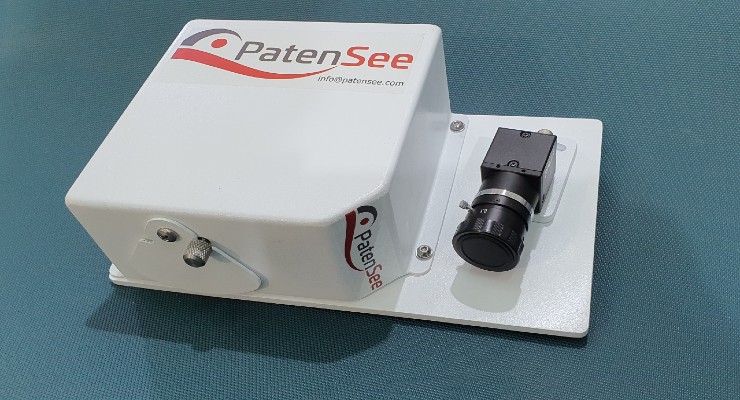Publication
Date
Link to Article
First Human Trial Begins for Contactless Hemodialysis Imaging Surveillance System
Trial to provide initial experiences in fistula surveillance for early detection and prediction of fistula stenosis.
Michael Barbella, Managing Editor03.09.21
PatenSee has begun its clinical trial to determine the efficacy of its machine vision-based surveillance system.
Taking place in Israel, the study will evaluate the ability of PatenSee’s device to perform contact-free surveillance of fistula stenosis similar to a nurse’s physical exam of hemodialysis patients.“The trial initiation is a significant milestone for PatenSee,” said Dr. Gal Goshen, CEO of PatenSee. “We are excited to complete all bench testing required to bring the system to the clinical stage and look forward to providing a reliable early detection system for fistula stenosis that can save lives, reduce suffering and address a challenge currently costing for payers and providers millions of dollars every year.”
The study is being led by Prof. Benaya Rozen-zvi, director of the Institute for Nephrology and Hypertension at Rabin Medical Center.
Collaboration with the medical doctors and nurses involved in the trial enabled easy integration of PatenSee’s system into the patient workflow of the dialysis center. The system is used in the pre-dialysis waiting room with minimal to no intervention of the medical staff and no interruption to the workflow.
“The clinical data we collect will be the first of its kind and will provide a critical step towards a reliable contact-free early detection tool for fistula stenosis,” explained Rozen-zvi. “Keeping the fistula open is a major clinical need, and early detection of stenosis allows for both simpler treatment and better prognosis for the patient. The non-invasive, contactless nature of PatenSee’s system adds another important benefit for both in-patient settings as well as in homecare in the future. The ability to assess patients effectively at a distance has become particularly important for both patients and clinicians during the worldwide COVID-19 pandemic.”
PatenSee is a clinical-stage medical device company that has developed a contactless surveillance system designed to detect early developing asymptomatic vascular stenosis in hemodialysis patients. By harnessing advanced, multi-modal imaging technologies and Machine Learning, PatenSee’s aims to flag stenosis risk at the earliest stage, enabling care teams to perform simple interventions to protect the patient’s hemodialysis lifeline, improve quality of care and prolong life expectancy. PatenSee addresses the dialysis market, which is expected to exceed $100 billion by 2024. PatenSee is a seed stage portfolio company of MEDX Xelerator.
MEDX Xelerator is a medical device incubator operating under the auspices of the Israel Innovation Authority. MEDX leverages the healthcare expertise and industry experience of its team with the industry leading insights of its partners – Boston Scientific, MEDX Ventures, and the Sheba Medical Center to nurture its portfolio companies into successful medical ventures for the benefit of patients and health care professionals.
Taking place in Israel, the study will evaluate the ability of PatenSee’s device to perform contact-free surveillance of fistula stenosis similar to a nurse’s physical exam of hemodialysis patients.“The trial initiation is a significant milestone for PatenSee,” said Dr. Gal Goshen, CEO of PatenSee. “We are excited to complete all bench testing required to bring the system to the clinical stage and look forward to providing a reliable early detection system for fistula stenosis that can save lives, reduce suffering and address a challenge currently costing for payers and providers millions of dollars every year.”
The study is being led by Prof. Benaya Rozen-zvi, director of the Institute for Nephrology and Hypertension at Rabin Medical Center.
Collaboration with the medical doctors and nurses involved in the trial enabled easy integration of PatenSee’s system into the patient workflow of the dialysis center. The system is used in the pre-dialysis waiting room with minimal to no intervention of the medical staff and no interruption to the workflow.
“The clinical data we collect will be the first of its kind and will provide a critical step towards a reliable contact-free early detection tool for fistula stenosis,” explained Rozen-zvi. “Keeping the fistula open is a major clinical need, and early detection of stenosis allows for both simpler treatment and better prognosis for the patient. The non-invasive, contactless nature of PatenSee’s system adds another important benefit for both in-patient settings as well as in homecare in the future. The ability to assess patients effectively at a distance has become particularly important for both patients and clinicians during the worldwide COVID-19 pandemic.”
PatenSee is a clinical-stage medical device company that has developed a contactless surveillance system designed to detect early developing asymptomatic vascular stenosis in hemodialysis patients. By harnessing advanced, multi-modal imaging technologies and Machine Learning, PatenSee’s aims to flag stenosis risk at the earliest stage, enabling care teams to perform simple interventions to protect the patient’s hemodialysis lifeline, improve quality of care and prolong life expectancy. PatenSee addresses the dialysis market, which is expected to exceed $100 billion by 2024. PatenSee is a seed stage portfolio company of MEDX Xelerator.
MEDX Xelerator is a medical device incubator operating under the auspices of the Israel Innovation Authority. MEDX leverages the healthcare expertise and industry experience of its team with the industry leading insights of its partners – Boston Scientific, MEDX Ventures, and the Sheba Medical Center to nurture its portfolio companies into successful medical ventures for the benefit of patients and health care professionals.

